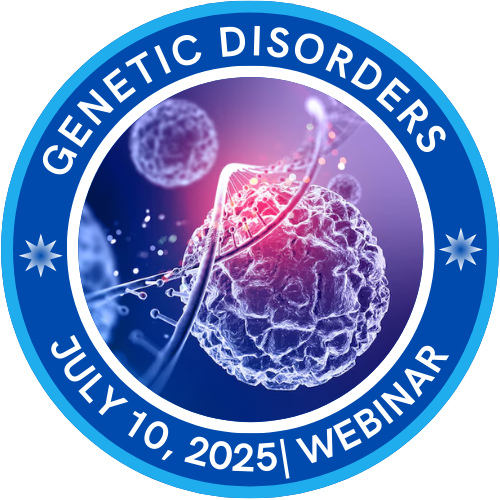It is with great pleasure that we welcome you to this insightful Webinar on Genetic Diseases, scheduled on July 10, 2025. This event brings together esteemed researchers, healthcare professionals, students, and enthusiasts from around the world to explore the latest advancements in the diagnosis, treatment, and prevention of genetic disorders. Genetic diseases affect millions globally, and with rapid developments in genomics, precision medicine, gene therapy, and CRISPR technology, we are witnessing groundbreaking innovations that are reshaping healthcare. Today’s discussions will shed light on cutting-edge research, ethical considerations, and future possibilities in this area.
Genetic disorders are medical conditions caused by abnormalities in an individual's DNA, including mutations, deletions, or duplications of genes or chromosomes. These disorders can be inherited from parents or occur spontaneously due to environmental or genetic factors. They are categorized into single-gene disorders (e.g., cystic fibrosis, sickle cell anemia), chromosomal disorders (e.g., Down syndrome, Turner syndrome), and complex disorders influenced by multiple genes and environmental factors (e.g., diabetes, heart disease). Advancements in genomic research, gene therapy, and CRISPR technology have revolutionized the understanding and treatment of genetic disorders, offering hope for precision medicine and targeted therapies. Early diagnosis through genetic screening and counseling plays a crucial role in managing these conditions effectively. However, ethical considerations, accessibility to treatments, and regulatory challenges remain significant concerns.

The global Genetic disorders market is set for significant expansion, projected to surpass USD 800 billion by 2035 and potentially exceed USD 1.5 trillion by 2050, driven by advancements in gene therapy, precision medicine, and CRISPR-based gene editing. The rise of personalized genomics, AI-powered genetic diagnostics, and breakthrough treatments like RNA-based therapies and stem cell technologies will revolutionize the landscape. North America will remain the dominant market, while Asia-Pacific is expected to experience the fastest growth due to increased genomic research investments and improved healthcare infrastructure. By 2040-2050, innovations such as whole-genome sequencing for newborn screening, gene-editing-based cures for inherited disorders, and AI-driven predictive analytics will reshape the industry. Despite rapid progress, challenges like high treatment costs, ethical concerns, and regulatory complexities will persist.